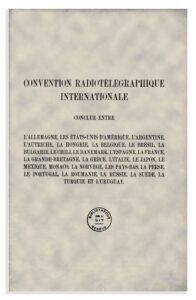International Radiotelegraph Conference (IRC)
A series of meetings establishing global standards and regulations for using radiotelegraphy, particularly in maritime communication.
The International Radiotelegraph Conference was a pivotal event in the history of maritime communication, bringing together representatives from various nations to create a unified framework for the use of radio frequencies, particularly in maritime contexts. These conferences were held periodically, with the first in 1906 in Berlin. The primary aim was to ensure that ships at sea could communicate effectively with each other and with coastal stations, regardless of the equipment or nationality of the vessel. This was especially important for safety, as it allowed for coordinating rescue operations and transmitting distress signals, such as the famous SOS.
One of the key outcomes of these conferences was the establishment of international agreements on the allocation of radio frequencies, the standardisation of distress signals, and the protocols for ship-to-ship and ship-to-shore communication. These agreements were crucial in preventing interference between radio operators and ensuring critical messages could be transmitted without delay. The regulations established by the International Radiotelegraph Conference laid the groundwork for modern maritime communication systems and have been continually updated to reflect advances in technology and changes in international law. Today, the legacy of these conferences can be seen in the global maritime communication standards overseen by the International Telecommunication Union (ITU).


